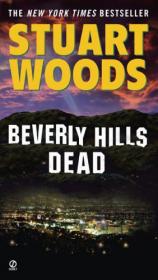Beverly Hills Dead
Review
Beverly Hills Dead
It
is the McCarthy era in America. Hollywood in the 1940s is a hotbed
of talent, as well as politically active characters, many of whom
Americans have come to love.
Rick Barron, the head of production for Centurion Pictures, is
assembling personalities and resources for a blockbuster film
titled Bitter Creek, which is colorfully referred to as a
“cattle and water western.” The former Beverly Hills
cop would like to cast new faces, all in leading roles. He
contracts with a rancher in Jackson Hole, Wyoming, to purchase a
large ranch for filming, and will use local cattlemen and others
from nearby towns as “extras.” The trade union for
extras takes serious issue with this decision, as they are being
shut out of the movie.
Meanhwhile, photocopies of Communist Party of America membership
cards are being sent to Rick’s office. He doesn’t
really take notice until one arrives that belongs to his wife.
Hearings organized by the House Un-American Activities Committee
(HUAC) are to begin very soon, and he doesn’t want anyone
from Centurion Studios, especially his wife, implicated.
Below the surface, many of the actors and studio executives are
quite concerned that the Screen Actors Guild will create a
Hollywood blacklist. Although it has committed to support them
throughout the HUAC meetings, there are whispers that governmental
pressures will force the guild to create and adhere to the
blacklist of their members.
Throughout life, people make a number of choices, some of which are
bad. Everyone has a past that eventually will catch up to them,
especially if they are in the limelight. When a famous
person’s past is discovered and revealed, there are often
ugly ramifications.
While usual favorites like Stone Barrington, Holly Barker and Will
Lee do not appear in this sequel to THE PRINCE OF BEVERLY HILLS,
Stuart Woods populates the novel with a slew of interesting
characters. One such individual is Vance Calder; born in England,
he has stage experience but is new to the Hollywood scene and to
films. Calder is immediately popular and successful enough for the
studio executives to sign him to an exclusive multi-picture
contract. There is political intrigue, Hollywood studio-types,
actors and actresses, and several subplots to keep the reader
interested and alert.
All in all, Woods has his audience captivated with a fresh look at
the HUAC hearings, Hollywood backlot adventures and intriguing
characters who we hope to see in future books.
Reviewed by Marge Fletcher on January 7, 2011





